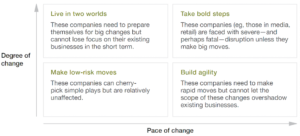From Pieter Welten – Prime Ventures (@pieterwelten)
Apple, Alphabet, Microsoft, Amazon and Facebook are today’s most valuable companies in the world. Their combined market capitalization amounts to a whopping $3.5 trillion! Since recently, these tech giants are accused of being ‘BAADD’. I love acronyms, as you might know, and this is definitely another one that puts a smile one my face. If you are BAADD you are considered to be too Big, Anti-competitive, Addictive, and Destructive to Democracy. It is not only the ‘Big Five’ that are labelled as BAADD, you should also think of the likes of Tencent, Alibaba, Baidu, Uber, and Tesla. Everybody is afraid of these large tech companies and believes that bad things are about to happen. But should we be afraid? Do they have a long-term unfair advantage? Should they be broken up?
Last week I was in the US and you feel the presence of the FAAMGs over there more than in Europe. Every time I realize that people make more often use of their products and services than I initially thought and these companies are even more deeply ingrained in society. Unsurprisingly, as a tech investor, I am ‘afraid’ of them and should probably always take these large tech players into account when I am assessing an investment opportunity. That’s not ideal. Therefore, the easy, obvious answer is probably to say ‘break them up’! It might make my life a bit easier. However, I personally don’t believe that it will make any difference, though. If you break-up Facebook for instance, network effects and know-how will allow the three brothers Facebook, Whatsapp and Instagram to grow to a significant size on its own, perhaps at a lower pace.
In my view, we should all embrace the unfairness and established companies and start-ups should be (more) creative and courageous. We should deal with them, rather than complaining. We should keep in my mind that the vast majority of the founders and C-level executives of these companies are paranoid and are worried about the threat posed by each other as well as other young, innovative start-ups. Moreover, their size and power comes with great responsibilities and maintaining trust and credibility with hundreds of millions of customers is not easy! Disgruntled customers can easily destroy any company’s reputation in a blink of an eye.
The harsh reality is also the fact that Facebook started as a simple ‘social network’ for students, Amazon as a virtual bookstore and Apple was a few months away from bankruptcy. Today, their customers simply prefer the services and products they offer to alternatives. It is as simple as that! When they started they had to fight other large, well-capitalized businesses and regulators.
So I find it disappointing that a lot of people now start complaining about these successful companies. What bankers were 10 years ago (i.e. ‘wankers’), are large tech companies today, i.e. lovely punching bags of the media, politicians, founders, and regulators. I wonder what all the large ‘incumbents’ were doing over the last 20 years. Why did JP Morgan or Santander not come up with innovative payment products like Square or Adyen? Why did Walmart and Ahold not start offering last mile delivery to restaurants? And do you believe they have supermarkets without cash registers anytime soon? Was Sony not well positioned to develop an ‘iSony’ or invest in smartphones? And how about General Motors? I am pretty sure they had an ‘unfair advantage’ in terms of know-how and human and capital resources to either develop an electric vehicle or a simple mobile ride-hailing application 10 years ago. What where they all doing? Why did they not make a couple of bold moves? Bold moves start as ‘small, internal decisions’ only.. Or in McKinsey’s words: ‘Be bold and you’ll keep climbing!’

There are hundreds of thousands beautiful, successful companies out there. Companies that are definitely here to stay! But to argue that Amazon, Apple, Uber, Airbnb and Facebook are BAADD or ‘bad’ for society, feels like resenting others’ success. It is actually a little bit sad. A lot of companies do have the human and capital resources, know-how, network, partnerships, geographical footprint, customer base, size, trust and credibility, but for whatever reason they don’t dare to Go Big, or Go Home! Are these companies a little bit SAADD (Small, Anti-Ambition, Dull, and simply Disappointing)? In my opinion broken companies and industries don’t have the right to tell a bunch of successful companies to be broken-up. They should put up a fight and control their own destiny. It always seems impossible until it’s done (thank you Nelson Mandela!).
